GOP

A RELATIVELY NEW front in the culture wars is emanating from the realm of finance: the push to increase financial investments that take into account “environmental, social, and governance” considerations. What is known in the finance industry as ESG has grown considerably over the past decade. According to the Global Fossil Fuel Divestment Commitments Database, the amount of wealth divested from fossil fuels worldwide has grown from $52 billion in 2014 to more than $40 trillion last year. But the increased visibility and prominence of ESG investing has triggered a backlash, with at least seven GOP-controlled states enacting anti-ESG policies and 15 others introducing bills to disallow the application of ESG principles in state investments such as pensions.
The anti-ESG push is coming from the usual suspects. Texas is heavily involved, due to the prominence of the fossil fuel industry in the state’s economy. Right-wing groups such as the Heritage Foundation and the American Legislative Exchange Council have also been big promoters of model anti-ESG legislation. West Virginia Attorney General Patrick Morrisey has formed a coalition with more than 20 of his counterparts to challenge the Securities and Exchange Commission’s ability to implement a climate disclosure rule, a case that could end up at the Supreme Court and hobble the executive branch’s ability to interpret and act on congressional statutes. Apparently, many conservative activists and politicians are only champions of the “free market” when it advances their ideological agendas.

When about 50 people found themselves stranded last week on Martha’s Vineyard, the island’s nonprofit social services agency called on local churches to help. “We rallied and did what any decent human being would do if strangers showed up,” local pastor Rev. Charlotte Wright told Sojourners this week.

I remember the flood of emotions I felt almost a year ago when I heard that the major news networks were calling the 2020 election results: overwhelming relief and renewed hope. Far beyond a victory for then-to-become President Joe Biden, it felt like a victory for our democracy — and an imperative to resuscitate, revitalize, and reinvent that democracy.
Fast forward a year: I’m filled with a festering weariness and escalating heartache.

THE SOUTHERN BAPTIST CONVENTION has long been a bellwether for conservative politics. At its annual gathering, controversial resolutions often forecast the upcoming battles of our nation’s culture wars. For too many in the denomination, soul competency has given way to partisan loyalty. This transformation began in 1979 when Paul Pressler and Paige Patterson launched an unprecedented, highly orchestrated campaign to persuade members to vote for a fundamentalist SBC president, who then began a cascade of fundamentalist appointments at every level of the denomination. Being “moderate” on abortion, gender roles, and gay rights, among other issues, became deal breakers. Those who found themselves on the outs with fundamentalist extremists were, as they have described, exiled.
Gendered hierarchies are fertile ground for sexual abuse, and in 2018 Patterson was fired as president of Southwestern Baptist Theological Seminary for mishandling sexual assault investigations. The toppling of this fundamentalist leader reverberated through the SBC, and a growing chorus of voices, most notably former member Beth Moore, called on the denomination to address this issue as well as restrictions placed on women in ministry. And the politicization of critical race theory, which David Theo Goldberg of the Boston Review called the “weaponization of colorblindness,” also perched high on the SBC agenda. Both issues figured prominently in the choice of a new SBC president this spring.
Candidate Ed Litton of Alabama conceded that there should be conversations about structural racism and investigations into the denomination’s handling of sexual abuse, while Mike Stone of Georgia doubled down on the fundamentalist position championed for years by Patterson and his acolytes. Thus, the 2021 election of the SBC president was seen as a referendum not only on these issues, but also on the Trumpian politics of political extremism and absolutism that underscore them. Stone took an early lead in the voting, which signaled to many observers that the bond between the SBC and Trump’s Republican Party would prove unbreakable. Moderates breathed a sigh of relief when Litton emerged as the winner; headlines noted that the SBC had pushed back against the denomination’s version of Trump extremism.

IN BACKLASH TO historic voter turnout, as of late May state legislators had introduced 389 bills to restrict voting in 48 states in the 2021 legislative sessions. The barrage of suppressive bills has been different from previous years in various ways. The sheer number of bills, the sweeping nature of the proposals, the procedural shenanigans, and the brazenness of lawmakers’ intent makes this like few legislative attempts in memory.
“Restrict” means the legislation would make it harder for Americans to register, stay on the rolls, and/or vote, as compared to existing state law. Most of these bills take aim at absentee voting and expanding voter ID requirements. Some would make voter registration harder, expand voter roll purges, and reduce early voting. Others seek to undermine the power of local officials and, in some cases, establish new criminal penalties to target those who run our elections.
Several of the concerning bills are bundled—a big number of anti-voter bills rolled into one. Take Georgia for example. Lots of people have heard about Georgia outlawing the provision of a bottle of water or a snack to people waiting in line to vote. But there’s more. Polling sites on wheels (mobile voting) are now effectively illegal in the state. Many voters who plan to vote by mail will be required to provide a driver’s license, social security number, state identification number, or a copy of identifying documentation. Ballot drop boxes will have to be located inside elections offices or early voting sites, likely resulting in the loss of convenient voting locations. Some provisions may exacerbate existing cyber-vulnerabilities or introduce new ones. These laws will clearly have a detrimental effect on the political voice of voters of color, especially those in the Black community. Mobile voting in Georgia, for example, was only used in Fulton County. That’s the home of Atlanta, which has the largest Black population of any city in the state.

The Graham-Cassidy-Heller-Johnson ACA repeal bill is the most radical and most disruptive plan to reorder one-sixth of the U.S. economy, in no small part due to the rush to pass something, anything that would fulfill the 7-year Republican promise to “repeal and replace Obamacare” ahead of a critical Sept. 30 deadline this Saturday. On Oct. 1 a new fiscal year starts for the U.S. government, forcing the GOP to start over with the complex budget maneuvering that allows them to pass a bill with only 50 votes in the Senate rather than the 60 that are generally required.
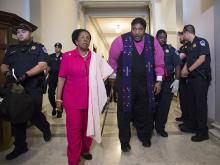
“We’re saying today it’s time for other clergy to come. It’s time for moral agents to step up. It’s time for us to go down to the house of power and challenge the way power is being used.”

Political and religious leaders offered prayers for Rep. Steve Scalise and four others who were injured in a shooting during a GOP congressional baseball practice.
The Democratic team stopped their practice following the shooting on June 14 in Alexandria, Va.
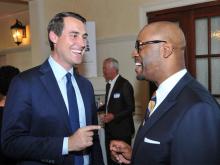
King is no latecomer on this issue. His views and his deep commitment to the LGBTQ community were shaped by his gay older brother’s suicide in the 1990s, an event that shook his family.
King’s sentiments were not unique, even for straight white believers like himself. What is unique is that they came from a candidate for governor of Florida who is running as both an evangelical Christian and a progressive Democrat.

“Barack Obama didn’t divide us,” said Nathan A. Finn, dean of the School of Theology and Missions at Union University, a Southern Baptist college in Jackson, Tenn.
“Donald Trump divided us. His personal behavior, his policy views, his temperament and character, his religious values, all were highly questionable.”

Vice President Mike Pence — a onetime altar boy who became an evangelical Protestant — proclaimed President Donald Trump a faithful supporter of Catholic values at the National Catholic Prayer Breakfast, an event that sought to set aside any friction between the president and the pope.
“Let me promise all of you, this administration hears you. This president stands with you,” Pence said to the 1,300 gathered.

Today, I have found freedom and hope — not by becoming straight, but by embracing my queer sexuality and coming out of the closet. New research on the science of sexual orientation as well as personal stories of well-adjusted and happy LGBTQ people helped me reject the religious system that told me there was something wrong with me because I was gay. Recently, the word “survivor” has felt as an appropriate label for myself in relation to reparative therapy, and I am so thankful to be in a much more welcoming environment today. But I cannot ignore the fact that many people today, including a lot of children and adolescents, are still being subjected the psychological torture that is conversion therapy.

The two major streams of Christian engagement on war are pacifism and just war theory, which comes out of Catholic social teaching. The pacifist response to Syria strikes is clearly opposed. As for the just war analysis, it takes a little explaining, but reaches the same conclusion.

In Trump’s first nominee, Judge Neil Gorsuch, abortion foes were convinced they had the jurist who would fulfill Trump’s campaign promise to appoint justices who would deliver the reversal they have worked decades to achieve. But now, after last week’s hearings before the Senate Judiciary Committee, some are voicing concern that Gorsuch might not be such a reliable anti-Roe vote after all.

Overall, states would be forced to absorb $880 billion in Medicaid cuts to prevent the reduction or elimination of Medicaid services, something states are in no position to do according to governors from both parties. The bill would cut almost $900 billion from Medicaid over ten years, mostly to pay for changes that would benefit high-income people and corporations.
And in a morally shocking move, it is not just the poor, but the older and sicker poor people who will fare the worst under the new law.
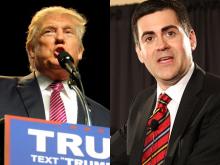
The pro-Trump evangelicals suffer from a spiritual crisis, not a political one.
Moore has challenged the foundations of conservative evangelical political engagement because they desperately needed to be shaken. For 35 years, the old-guard religious right has uncritically coddled, defended, and promoted the Republican Party.
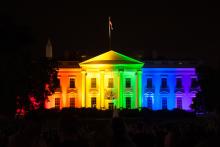
Lost amid the ongoing furor over President Trump’s travel ban, and the ecstasy (and agony) over his first pick for the Supreme Court, was another move on Jan. 31 that is starting to give social conservatives pause: Trump’s continuance of the executive order by President Obama’s policy that protects gay and transgender employees from discrimination while working for federal contractors.
And not only did Trump extend the protections, but he did so in powerful language that used the community’s own “LGBTQ” identifier, while vowing that Trump would be “respectful and supportive of LGBTQ rights.”
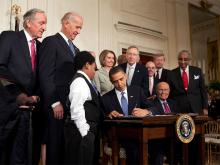
Bishops will examine proposals to amend or replace Obamacare but said that “for now that a repeal of key provisions of the Affordable Care Act ought not be undertaken without the concurrent passage of a replacement plan that ensures access to adequate health care for the millions of people who now rely upon it for their wellbeing.”
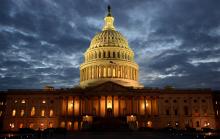
The U.S. Senate voted 51 to 48 in the early hours of Jan. 12 to begin the process of repealing major portions of the Affordable Care Act, also known as Obamacare. The vote went on for seven hours, as Senate Democrats attempted to build on growing unease among House and Senate Republicans over repealing major provisions of the ACA without a repeal in place. Ultimately, only Sen. Rand Paul (R-Ky.) joined the Democrats in voting against, and the resolution was approved.
Last night’s hours-long late night vote is known as a “vote-a-rama,” a long series of back-to-back votes in the Senate. Though atypical, it’s become a more common practice for major votes in the Senate.
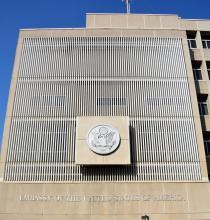
It wasn’t long ago that Rubio and Cruz criticized the Obama administration for the deaths of four Americans, including Chris Stevens, the U.S. ambassador to Libya, in a terrorist attack on a U.S. consulate in Benghazi.
“Congress and the Executive Branch need to work together to do everything possible to make sure something like this does not happen again,” said Rubio in June 2016.